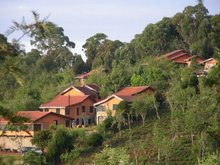
Keystone's Bee Museum in Ooty was inaugurated on 7 October 2006 by Ms Meena Gupta, Secretary, Ministry of Tribal affairs, Govt of India.
Befittingly, just before the inauguration, a honeycomb of
Apis dorsata, the giant rock bees, appeared at the museum entrance.
The Bee Museum aims to impart nature education to school students as well as citizens from all walks of life. The museum would create awareness on conservation and livelihood based on eco-development approaches. It is the first of its kind, in terms of focusing on traditional knowledge and practices of indigenous communities.
The Bee Museum aims to be a vibrant space, with innovative workshops, live demonstration units of bees, specimens and traditional as well as modern tools used in beekeeping and honey gathering. The Bee Museum network brings together indigenous honey hunters and school students.
In the long run, this conservation inititiave will help in the sustainable harvest of honey as well as the conservation of the honey bee species. It is hoped that the sowing of the seed of conservation in the minds of people involved in honey harvesting as well as of the young generation will surely bring about a significant change in the near future.
The response so far has been extremely encouraging.















































































